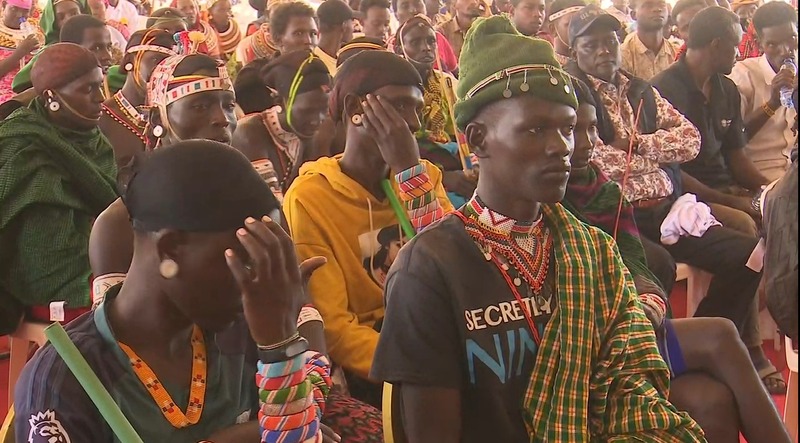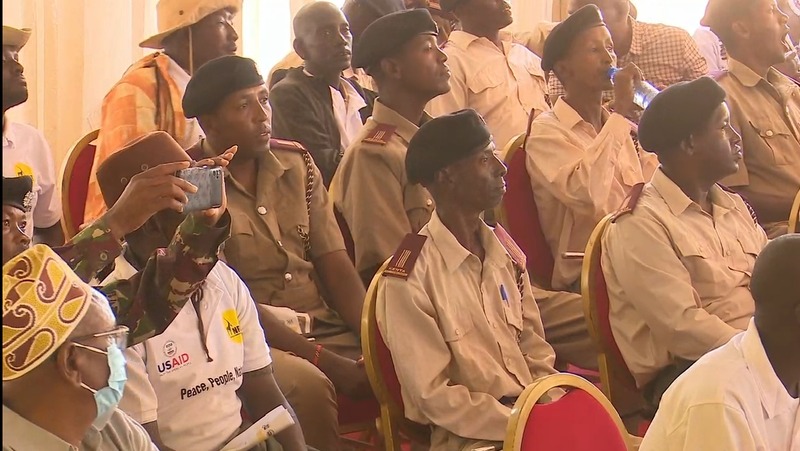Isiolo, Samburu, Marsabit sign peace accord to end ceaseless conflicts

The proliferation of illegal firearms, expansionist agenda and political intrigues also contribute to the conflicts which continue to deny the region sustainable development.
Isiolo, Marsabit, Samburu and Meru counties have signed a peace agreement to end incessant conflicts and achieve lasting peace among the local communities.
The counties have for a long time been embroiled in tussles over competition for water and pasture and land disputes mostly within the boundaries which have sparked conflicts that have seen hundreds of lives lost and thousands of livestock stolen, impoverishing local pastoralists.
More To Read
- Senate Bill proposes five-year jail term, Sh2 million fine for livestock thieves
- Over 700 illegal firearms surrendered as Murkomen says State will burn guns once tally hits 1,000
- Police recover stolen camels in Turkana after coordinated operation
- Two more AK-47s surrendered as Elgeyo Marakwet disarmament drive nets 301 firearms
- Interior CS Murkomen flags rising boda boda violence amid broader stability
- Four officers linked to illegal arms, ammunition trade arrested
The proliferation of illegal firearms, expansionist agenda and political intrigues also contribute to the conflicts which continue to deny the region sustainable development.
The communities in the four counties have in the past been targeting each other during cattle raids.
Commercialisation of cattle rustling and rising demand for meat products in other counties including Nairobi has seen the incidents soar as the young warriors risk their lives for either heroism, to restock or to earn a living from the crime.
Meru which largely practices farming has been involved in clashes with camel herders for ostensibly grazing the animals on their farms with bandits targeting their cattle which are transported to as far as Serolipi in neighbouring Samburu County.
Collusion between criminals across the counties which facilitates easy movement of stolen animals across borders has been a major impediment to the government's efforts to rein in crime.
Some of the incidents reported in the past include criminals living on the Isiolo side colluding with those on the Samburu side and some in Samburu joining hands with others in Isiolo to rein terror on Meru residents.
Cases of residents hosting criminals from their communities have also been rife across the region. But the coming together of communities from the four counties is expected to end the bad blood between the communities and promote peaceful coexistence.
Community representatives, leaders and elders signed the peace accord within the Nannapa area in Laisamis, Marsabit County, vowing to jointly spearhead peace initiatives for peace and stability in the region.
The four counties resolved to stop herding using guns as it was creating tension with the neighbours and to approach local grazing committees for permission before moving with their animals to neighbouring counties or areas.
 Chiefs during the peace meeting in Laisamis, Marsabit County. (Handout)
Chiefs during the peace meeting in Laisamis, Marsabit County. (Handout)
Peter Lekurtut said besides jointly and continually crusading for peace, the communities had also agreed to work closely with authorities in exposing criminals to secure the region.
"We want criminals to carry their cross and communities not to be punished for crimes committed by a single person. We will share information on known criminals so that they are pursued, arrested and prosecuted," he said.
Apart from the peace meetings, elders from Isiolo, Samburu and Marsabit were tasked with engaging young warriors popularly known as Morans in efforts to persuade them to shun cattle rustling.
Sabina Napoe said being predominantly pastoralist, local communities must embrace modern farming methods and engage in legitimate income-generating activities, not unleashing terror and stealing from innocent citizens.
"A life lost cannot be regained. Let us shun attacking each other over animals that die when drought strikes and consider alternative livelihoods," she said, adding that women bore the biggest brunt of insecurity.
Jeremiah Kirimi said it was only by living peacefully that the region would achieve optimal development. "We all must coexist and expose anyone out to divide us because that is what will compound our woes".
Isiolo's Cherab MCA Halima Abgudo said community engagements must be upscaled and the peace accord monitored regularly to establish if it was achieving the desired results.
The MCA further implored the counties to enrol the Morans to local technical institutions, saying it would help them abandon the retrogressive practice of cattle rustling.
"We must also shun profiling of communities and call out the individual criminals so that action is taken against them," Halima said.
Marsabit County Commissioner James Kamau who witnessed the signing of the agreement, said parents whose sons are involved in crime will not be spared.
"How do you allow stolen animals into your home without asking where they have come from?" he posed, imploring parents and caregivers to join hands with the security team in containing the vice.
He appealed to State and non-state actors to initiate programs to support Morans so that they stay engaged and do not go back to crime.
Northern Rangelands Trust CEO Tom Lalampaa stressed the need to use data on the number of people who have been killed during past cattle rustling incidents to dissuade Morans from the practice.
"It is the best way to make them understand how destructive rustling is and encourage them to be ambassadors of peace to stop the killings," he said.
Reports show that more than 100 people have been killed in banditry and cattle rustling incidents across the four counties in the last two years, and more than 20, 000 animals were stolen during the same period.
Top Stories Today














































